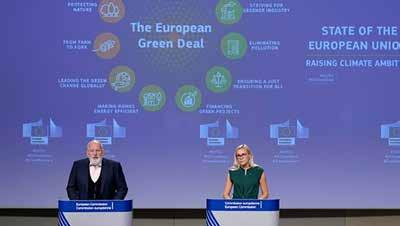
3 minute read
Political developments
Recognition of the need to fight climate change has increased over the past few decades and political decision-makers are focusing on action plans at international, regional and national levels. We are actively responding to these changes, not least because they are presenting us with further opportunities for growth. We have placed sustainability at the centre of our business strategy, making associated changes to the way we develop our grid assets and carry out system operation and market facilitation activities. Our corporate activities support European and national political objectives. Given the urgency with which climate change must be tackled, we will need to deliver the necessary infrastructure and integrate renewables even faster into the system than we have been doing until now. Along with all our stakeholders, we are committed to delivering on these decarbonisation goals in the best interests of society.
International developments
In 2021, the UN’s International Panel on Climate Change (IPCC) called for “strong, rapid and sustained reductions”4 in GHG emissions. Moreover, the outcomes of COP26 in Glasgow included a wide-ranging set of decisions and resolutions that reflected the interests and aspirations of the 197 Parties in attendance. The Parties agreed to strengthen their emission reduction ambitions in order to align their national climate pledges with the 2015 Paris Agreement and limit the rise in the average global temperature to well below 2°C (preferably 1.5°C) above pre-industrial levels. For the first time in the history of the Conference of the Parties, the role of fossil fuels was explicitly mentioned, alongside a commitment to “phase down” coal power.
European developments
In July 2021, the European Climate Law entered into force, writing into law the goals set out in the European Green Deal. The law set a legally binding target of net zero greenhouse gas emissions by 2050 for member states, with an intermediary target of reducing net emissions by at least 55% by 2030 compared to 1990 levels. To translate these goals into concrete steps, the European Commission introduced an impressive package of legislative proposals during the same month called ‘Fit for 55’. Moreover, the European Commission has made it clear that sustainable finance has a key role to play in meeting its policy objectives - indeed, the EU Action Plan on Financing Sustainable Growth (which was published in 2018) led to the creation of the EU Taxonomy. The latter is a classification system for sustainable economic activities that can be used by companies, investors and policymakers to help shift financing towards environmentally sustainable undertakings through the provision of clear metrics. The EU Taxonomy encompasses four conditions that activities must successfully meet in order to be considered as ‘aligned’ with it. Following this, the link between these activities and related turnover, CAPEX and OPEX must be disclosed.
4 Intergovernmental Panel on Climate Change, ‘Climate change widespread, rapid, and intensifying’ - IPCC, https://www.ipcc.ch/2021/08/09/ar6-wg1-20210809-pr/
National developments
Political developments in Germany and Belgium are also supporting decarbonisation. A new coalition government took office in Germany in November 2021, and, under the slogan ‘Dare More Progress’, it outlined its plans to accelerate the energy transition and modernise Europe’s biggest economy. Key points included in its programme are the phasing out of coal by 2030 and the speeding up of renewable energy development, so that it occupies an 80% share of the energy mix by 2030. The Government has also committed itself to reaching 30 GW of offshore capacity by 2030 and 70 GW by 2045; 200 GW of photovoltaic capacity by 2030; and allocating 2% of the country’s area to onshore wind. It also wishes to deploy gas capacities to secure the system and speed up permitting procedures for grid projects - particularly those which involve DC lines.
The autumn 2020 coalition treaty of the Belgian Government also focuses on climate and energy issues. It supports the climate ambitions outlined in the 2015 Paris Agreement and the European Green Deal and includes ambitious targets related to RES development, in particular (offshore) wind and solar generation.
EU Taxonomy eligible activities
99.94%
Turnover
99.92%
CAPEX
100%
OPEX







